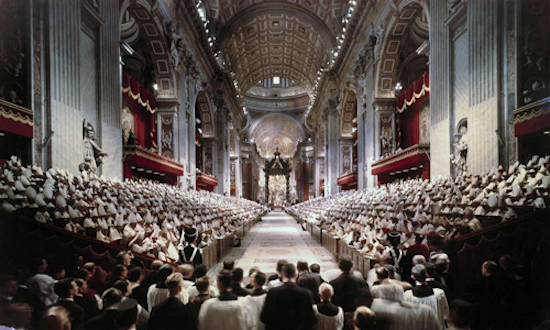
Related
- Vatican II at 50: For Twin Cities Catholics, council continues to stir faith and heat emotions
- Archdiocese well positioned to carry out Vatican II
- Remembering Vatican II, in her own words
December 8 marked 50th years since the closing of the Second Vatican Council. Here are the 16 documents approved by the Second Vatican Council and their dates of promulgation:
Constitution on the Sacred Liturgy
“Sacrosanctum Concilium,” Dec. 4, 1963.
It ordered an extensive revision of worship so that people would have a clearer sense of their own involvement in the Mass and other rites.
Decree on the Instruments of Social Communication
“Inter Mirifica,” Dec. 4, 1963.
It called on members of the church, especially the laity, to instill “a human and Christian spirit” into newspapers, magazines, books, films, radio and television.
Dogmatic Constitution on the Church
“Lumen Gentium,” Nov. 21, 1964.
It presented the church as a mystery, as a communion of baptized believers, as the people of God, as the body of Christ and as a pilgrim moving toward fulfillment in heaven but marked on earth with “a sanctity that is real, although imperfect.”
Decree on Ecumenism
“Unitatis Redintegratio,” Nov. 21, 1964.
It said that ecumenism should be everyone’s concern and that genuine ecumenism involves a continual personal and institutional renewal.
Decree on Eastern Catholic Churches
“Orientalium Ecclesiarum,” Nov. 21, 1964.
It stated that variety within the church does not harm its unity and that Eastern Catholic churches should retain their own traditions.
Decree on the Bishops’ Pastoral Office in the Church
“Christus Dominus,” Oct. 28, 1965.
It said each bishop has full ordinary power in his own diocese and is expected to present Christian doctrine in ways adapted to the times. It urged conferences of bishops to exercise pastoral direction jointly.
Decree on Priestly Formation
“Optatam Totius,” Oct. 28, 1965.
It recommended that seminaries pay attention to the spiritual, intellectual and disciplinary formation necessary to prepare priesthood students to become good pastors.
Decree on the Appropriate Renewal of the Religious Life
“Perfectae Caritatis,” Oct. 28, 1965.
It provided guidelines for the personal and institutional renewal of the lives of nuns, brothers and priests belonging to religious orders.
Declaration on the Relationship of the Church to Non-Christian Religions
“Nostra Aetate,” Oct. 28, 1965.
It said the Catholic Church rejects nothing that is true and holy in non-Christian religions, called for an end to anti-Semitism and said any discrimination based on race, color, religion or condition of life is foreign to the mind of Christ.
Declaration on Christian Education
“Gravissimum Educationis,” Oct. 28, 1965.
It affirmed the right of parents to choose the type of education they want for their children, upheld the importance of Catholic schools and defended freedom of inquiry in Catholic colleges and universities.
Dogmatic Constitution on Divine Revelation
“Dei Verbum,” Nov. 18, 1965.
It said the church depends on Scripture and tradition as the one deposit of God’s word and commended the use of modern scientific scholarship in studying Scripture.
Decree on the Apostolate of the Laity
“Apostolicam Actuositatem,” Nov. 18, 1965.
It said the laity should influence their surroundings with Christ’s teachings.
Declaration on Religious Freedom
“Dignitatis Humanae,” Dec. 7, 1965.
It said that religious liberty is a right found in the dignity of each person and that no one should be forced to act in a way contrary to his or her own beliefs.
Decree on the Ministry and Life of Priests
“Presbyterorum Ordinis,” Dec. 7, 1965.
It said the primary duty of priests is to proclaim the Gospel to all, approved and encouraged celibacy as a gift and recommended fair salaries.
Decree on the Church’s Missionary Activity
“Ad Gentes,” Dec. 7, 1965.
It said missionary activity should help the social and economic welfare of people and not force anyone to accept the faith.
Pastoral Constitution on the Church in the Modern World
“Gaudium et Spes,” Dec. 7, 1965.
It said the church must talk to atheists, a continual campaign must be waged for peace, nuclear war is unthinkable and aid to underdeveloped nations is urgent. It said marriage was not just for procreation and urged science to find an acceptable means of birth regulation.



